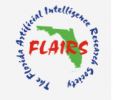Twenty-Third International Florida AI Research Society Conference (FLAIRS-23)
FLAIRS-23
The 23rd International FLAIRS Conference
The 23rd Florida Artificial Intelligence Research Society Conference (FLAIRS-23) will be held May 19-21, 2010 at The Shores Resort & Spa in Daytona Beach, Florida, USA. FLAIRS-23 continues a tradition of presenting and discussing artificial intelligence research in a convivial atmosphere within a beautiful setting. Events will include invited speakers, special tracks, discussion panels, and presentations of papers and posters. FLAIRS encourages student authors to submit papers. In addition to a Best Paper award, there will be a Best Student Paper award for the best paper written primarily by students.
Call for Papers
General Conference
Submission of papers for presentation at the conference is now invited. Topics of interest are in all areas of artificial intelligence, including:
Foundations
|
Applications
|
Architectures
|
Implications
|
Speaker and Presenter Information
Eugene Charniak Eugene Charniak is University Professor of Computer Science and Cognitive Science at Brown University and past chair of the Department of Computer Science. He received his A.B. degree in Physics from University of Chicago, and a Ph.D. from M.I.T. in Computer Science. He has published four books, the most recent being Statistical Language Learning. He is a Fellow of the American Association of Artificial Intelligence and was previously a Councilor of the organization. His research has always been in the area of language understanding or technologies which relate to it. Over the last 18 years years he has been interested in statistical techniques for many areas of language processing including parsing and, most recently, discourse. Janet Kolodner Janet Kolodner is a Regents' Professor in the School of Interactive Computing at Georgia Institute of Technology. Her research, for the past 30 years, has addressed a wide variety of issues in learning, memory, and problem solving, both in computers and in people. During the 1980's, she pioneered the computer method called case-based reasoning, which allows a computer to reason and learn from its experiences. The first case-based design aids (CBDA'S) came from her lab. Archie-2, for example, helped architecture students with conceptual design. During the early 1990's, she used the cognitive model implied by case-based reasoning to address issues in creative design. JULIA planned meals, Creative JULIA figured out what to do with leftover rice, IMPROVISOR did simple mechanical design, and ALEC simulated Alexander Graham Bell in his invention of the telephone. Later in the 1990's, she used the cognitive model in case-based reasoning to guide design of science curriculum for middle school. Learning by Design (TM) is a design-based learning approach and an inquiry-oriented project-based approach to science learning that has children learn science in the context of design experiences. The sequencing of activities in the classroom encourages students to reflect on their design and science experiences in ways that CBR says are appropriate for integrating them well into memory. LBD curriculum units and the sequencing structures in LBD provide the backbone for a full 3-year middle-school science curriculum called Project-Based Inquiry Science (PBIS), published by It's About Time, Inc. More recently, Kolodner's research uses what she learned in designing LBD to create informal learning environments to help middle schoolers come to think of themselves as competent scientific reasoners. In Kitchen Science Investigators, fifth and sixth graders learn science in the context of cooking. In Hovering Around, they learn about motion and forces, about airflow, and how to explain in the context of designing hovercraft. Kolodner is founding Editor in Chief of the Journal of the Learning Sciences and a founder and first Executive Officer of the International Society for the Learning Sciences. She has headed up the Cognitive Science Program at Georgia Tech and headed an organization called EduTech in the mid-90's whose mission was to use what we know about cognition to design educational software and integrate it appropriately into educational environments. Herbert H. Clark Herbert H. Clark is Professor of Psychology at Stanford University. He is the author of several books on language and language use, including Psychology and Language (a textbook co-authored with Eve V. Clark), Arenas of Language Use, and Using Language. He is also author of over one hundred research articles and chapters. His research is concerned with speaking and understanding in interactive communication, especially conversation. Clark was a John Simon Guggenheim Fellow and a fellow at the Center for Advanced Study in the Behavioral Sciences. He was elected to the American Academy of Arts and Sciences and to the Royal Dutch Academy of Arts and Sciences. Other Speakers include David Poole, Anthony Cohn, and Jorge Ramirez.Relevant Government Agencies
Air Force, Army, Navy & Marine Corps, Intelligence Agencies, DOD & Military
When
Wed-Fri, May 19-21, 2010
Where
The Shores Resort & Spa
2637 South Atlantic Avenue
Daytona Beach, FL 32118
Get directions
Website
Click here to visit event website
Event Sponsors
Organizer
FLAIRS






